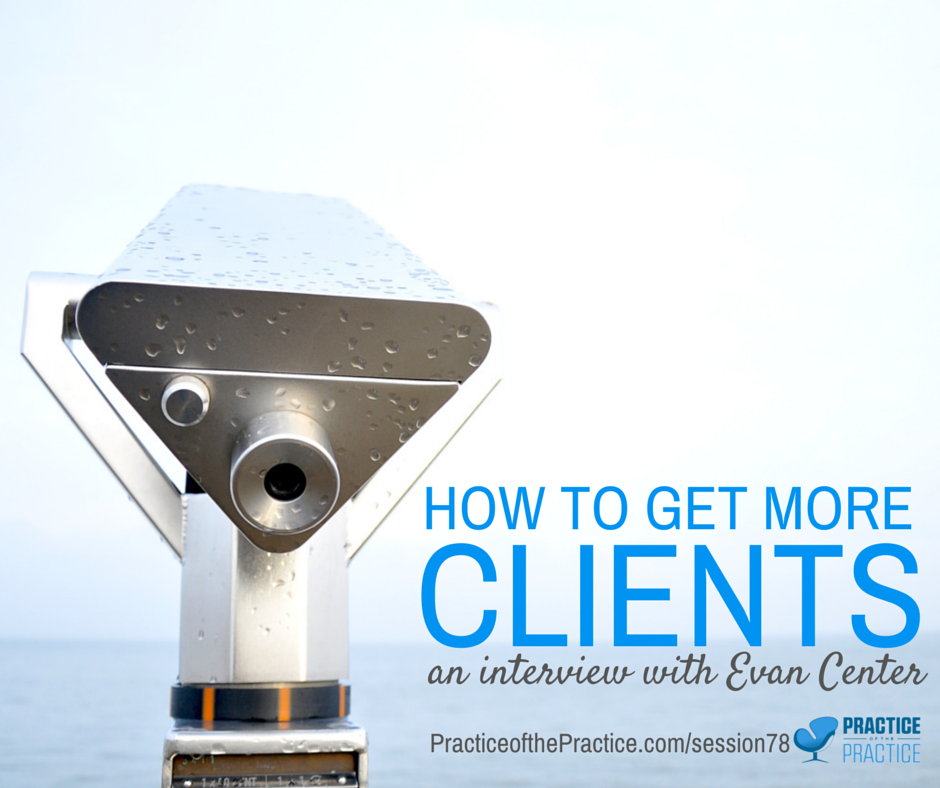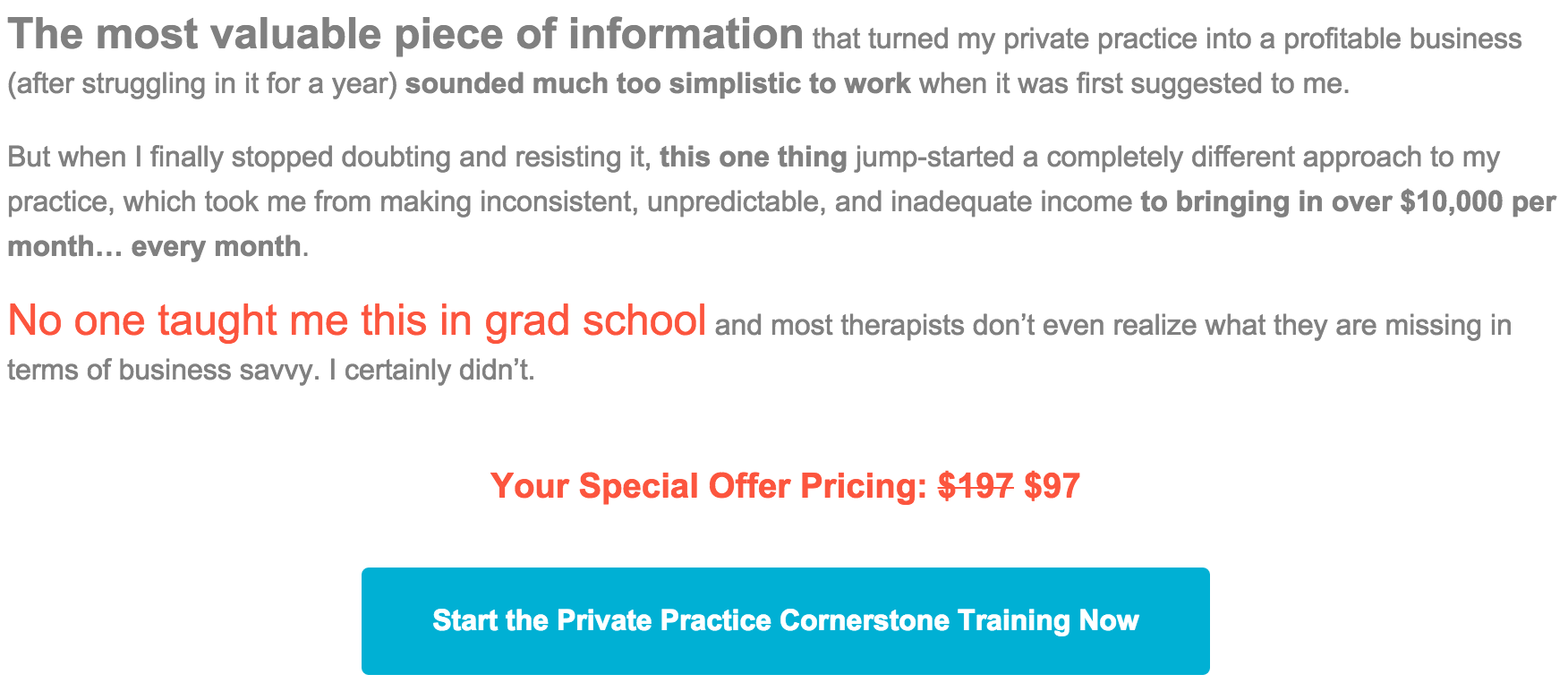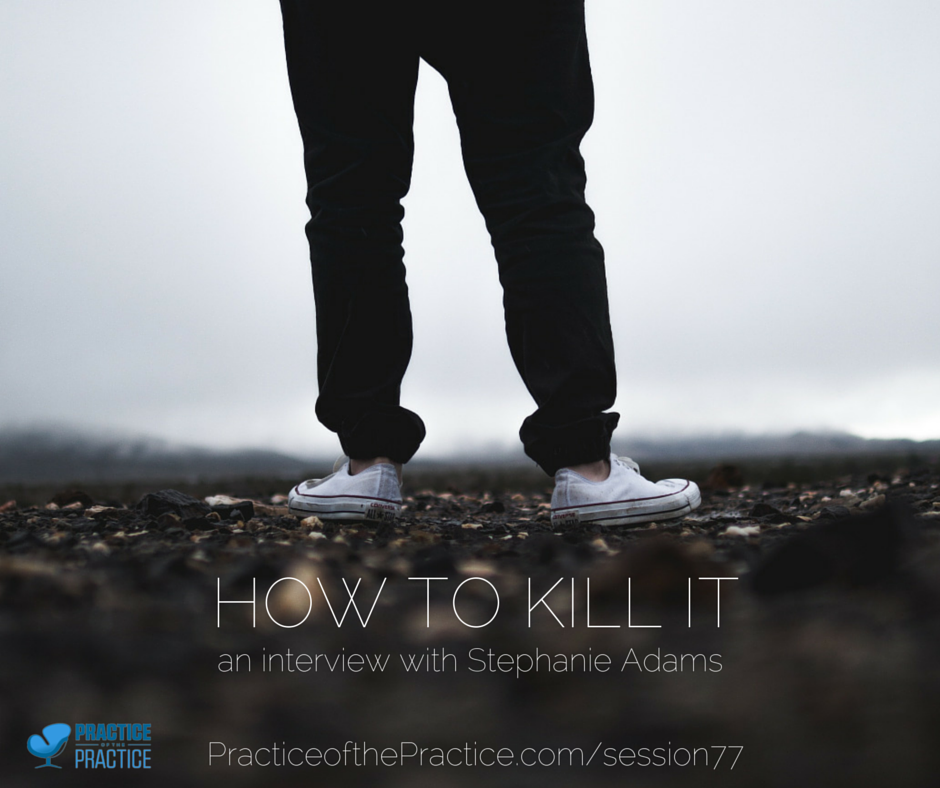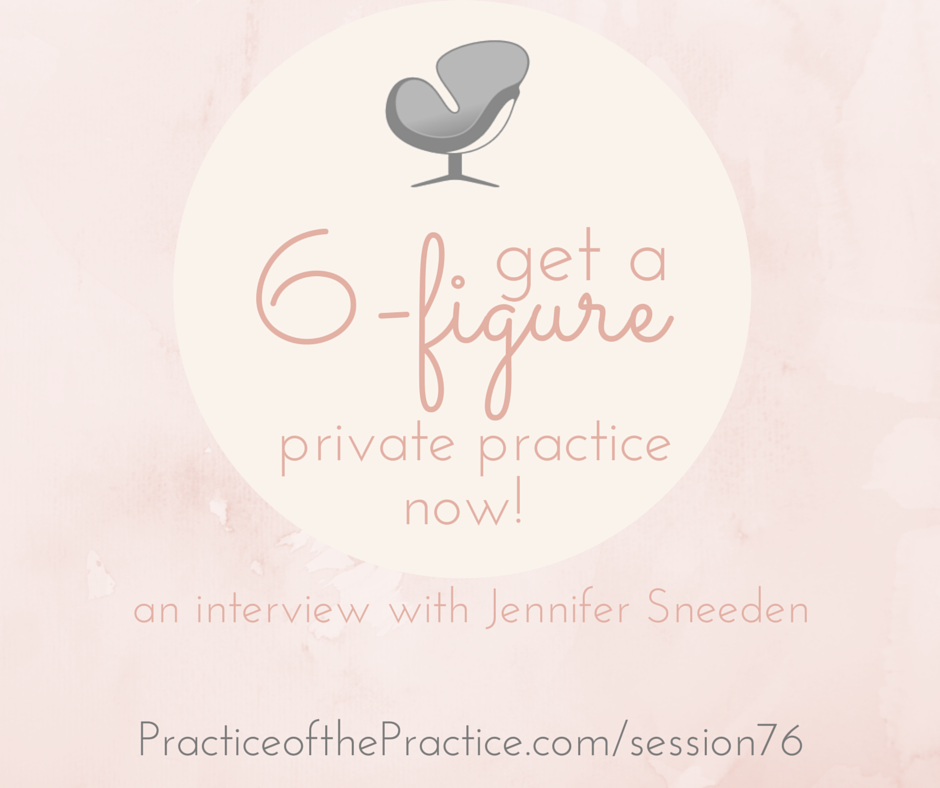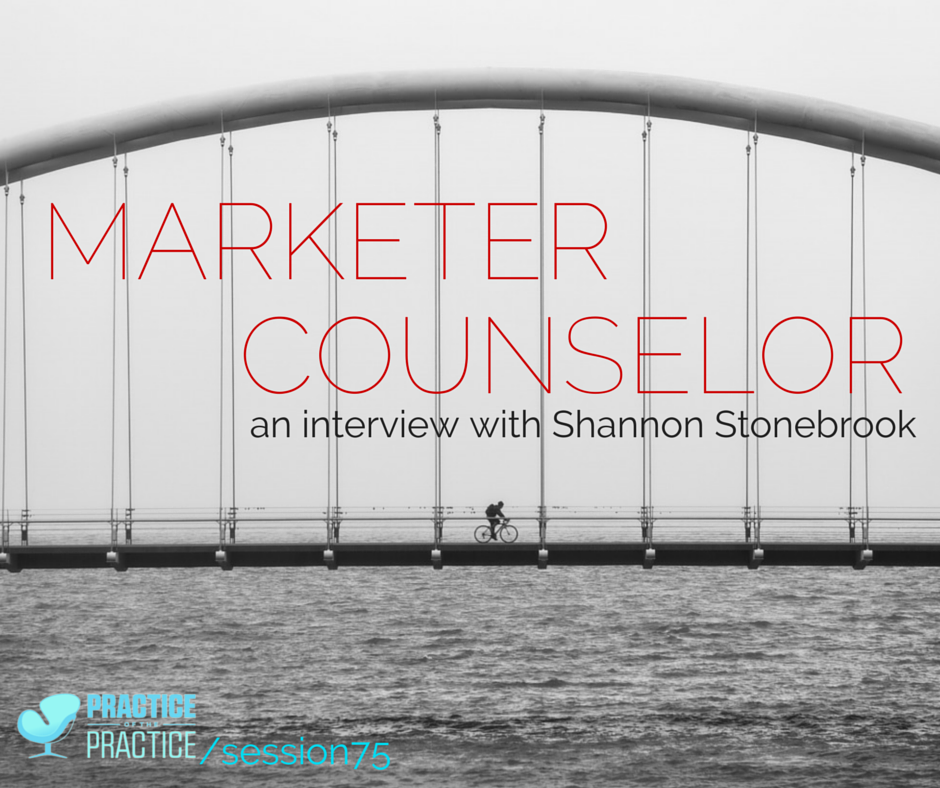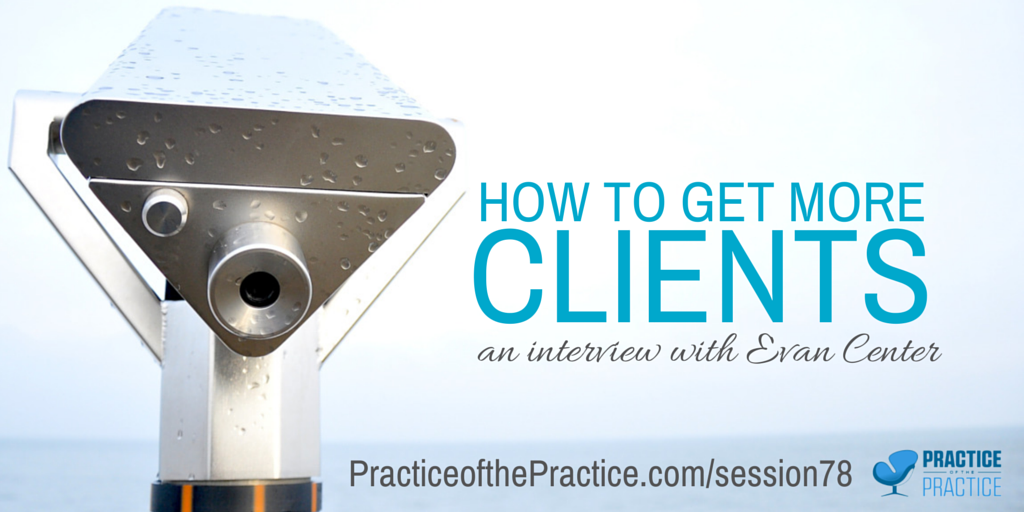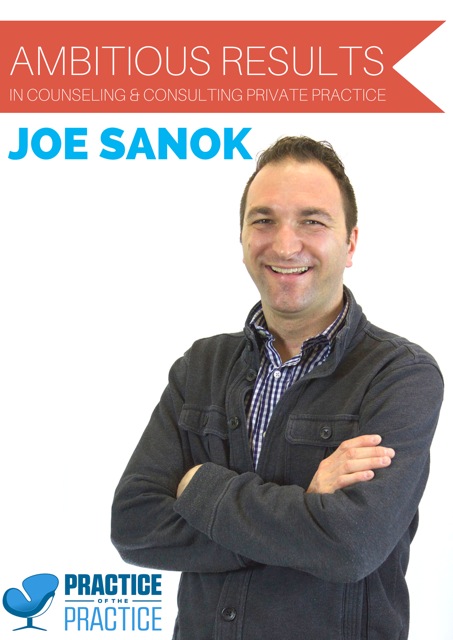Podcast: Play in new window | Download | Embed
Today’s Private Practice Podcast Sponsor
If you want to build your strength and endurance, you can do repetitive physical exercises like running or walking. Similarly, to improve a specific cognitive skill like attention, you can perform a repetitive mental exercise and reap the benefits over time.
Muse is the mental equivalent of a treadmill, which helps you exercise your brain with focused attention training. It improves your attention by training you to become aware of your distractions quicker and react faster to regain focus on what you’re doing.
Here’s my unboxing of the Muse:
What you will discover in this podcast
3:00 How I am slowing my mind down
8:11 Someone who “totally transformed” Evan’s world
11:16 How Evan stopped taking insurance and started running her counseling practice as a business
14:43 How Evan started a group intensive e-course
19:00 Why homework matters
23:41 What people don’t know
24:01 Technical side of running an e-course
PoP Culture Meet Evan Center
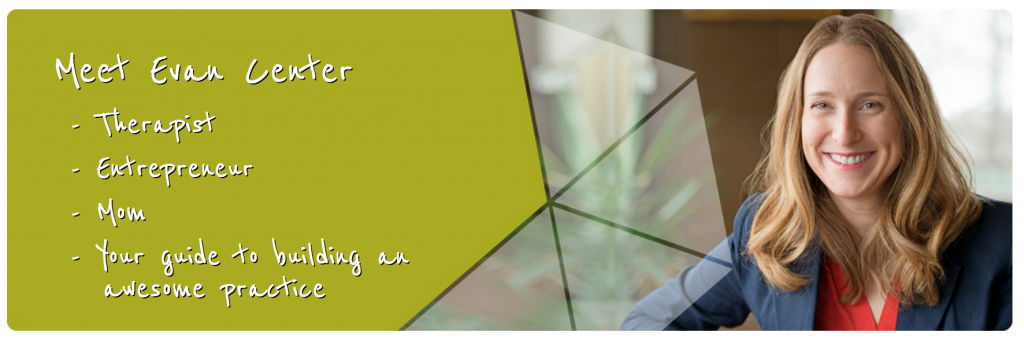 I met Evan Center at the 2015 ACA conference.
I met Evan Center at the 2015 ACA conference.
Evan Center, MS, LCPC runs a thriving, face-to-face private practice in Bozeman, Montana. (But it wasn’t always the land-of-plenty for her business.) Evan has sought out training in marketing, sales writing and finance in order to make her practice what it is. She believes therapists deserve to have stability and plenty in their lives so they can create balance and continue to offer optimal therapeutic support to their communities. Evan offers other therapists training around how to shape their practice so that they:
- Attract their ideal clients to them
- Structure their practice to create steady income
- Make a greater impact on the clients they serve and their community
If you know you want your private practice to do more, but you don’t know how, contact Center Institute today.
Discount for the Practice of the Practice listeners $100 off! www.CenterInstitute.com/joe
Here’s a snapshot from the page, you have to check it out!!!
Podcasts you may have missed
Music From The Podcast
Silence is Sexy
madelyniris
For your social media
Joseph R. Sanok, MA, LLP, LPC, NCC
Joe Sanok is an ambitious results expert. He is a private practice business consultant and counselor that helps small businesses and counselors in private practice to increase revenue and have more fun! He helps owners with website design, vision, growth, and using their time to create income through being a private practice consultant.
Joe was frustrated with his lack of business and marketing skills when he left graduate school. He loved helping people through counseling, but felt that often people couldn’t find him. Over the past few years he has grown his skills, income, and ability to lead others, while still maintaining an active private practice in Traverse City, MI.
To link to Joe’s Google+ .
Here is the Transcription of This Podcast
How to Get More Clients An interview with Private Practice Consultant Evan Center
This is the Practice of the Practice Podcast with Joe Sanok, Session 78. I’m Joe Sanok, your host. Welcome to the Practice of the Practice Podcast with me, Joe Sanok. I’m so glad you are here. What a crazy week it’s been. My mom had surgery last Tuesday, and so I spent two days with my family down at the hospital and then went back to Traverse City to do counseling and consulting sessions and then went back down there for two days. She’s down in Grand Rapids, which is a couple of hours away, and just a whirlwind — but it just put such a great spotlight on the fact that I no longer work for the community college that I make my own schedule. And if I have life happen, I can just like take time off. I can go down there, I can pause everything and do what I need to do. Like for example, in May, at my daughter’s school, they’re doing dads and donuts in the morning, where all the dads come to the classroom and hang out and eat donuts, and like I’m really excited about it. I think it’s going to be awesome. So it’s just super cool.
Well, today’s sponsor — I want to start with that, is Muse. If you go to choosemuse.com, you can learn all about Muse, and Muse is this amazing biofeedback headband. I’ve been using it with counseling sessions with a lot of — mostly like high schoolers. And if you’ll picture just like a kind of headband made out of plastic with sensors on it that go across like above your forehead — or on your forehead and kind of then goes behind your ears, sort of like sunglasses would, it then picks up kind of your brainwaves on the front and then behind your ears, and it is so cool, like I love it personally because it’s teaching me to meditate and just relax a little bit, and for a lot of my counseling clients, they are just digging it because it connects to an app that then gives you immediate feedback. So you’re sitting there quietly just kind of counting your breaths in and out and you hear this like storm, and as you calm down, you hear waves. And then if you’re quiet enough, you hear birds.
Now, I’ve personally never got birds, but I’ve had these clients that their first time got like five birds, and I am just blown away. And then it gives you your percentage of time in calm mind and percentage in kind of in the middle mind. I forgot what they call that, but then, the last one is active mind. And so believe it or not, I have bit of an active mind, so it’s really been helpful for me. I heard about it from Pat Flynn and a few other podcasters that are using it and connected with them, and they’re one of our sponsors at the Most Awesome Conference.
So check them out at choosemuse.com. It’s amazing just how much it’s engaged, especially my teen clients.
How I am slowing my mind down
So today, I am interviewing Evan Center from centerinstitute.com. I met her at the ACA conference. And Evan, I know she didn’t come out of nowhere. I know she’s been working really hard, but to me, it’s like she came out of nowhere. She’s just doing some really cool work just taking a lot of the concepts that I’ve been talking about, that Kelly and Miranda have been talking about, and she’s just doing an amazing job. Her website is beautiful and super well-designed. She’s a therapist and entrepreneur. She’s a mom, and she says she’s your guide to building an awesome practice. And I would agree. Her emails and what she’s doing is just super cool.
So a little bit about Evan: Evan runs a thriving private practice in face-to-face private practice in Montana. For her, it wasn’t always thriving, and you’ll hear a little bit about that, but she learned a lot about marketing, sales writing, finance, in order to just make her practice grow. And her core belief is that therapists deserve to have a stable and plentiful lifestyle where they can have balance and they can offer amazing therapy services to their communities. She offers therapists all sorts of really cool things like ways to attract their ideal clients, structuring their practice, making a greater impact, so she’s just doing cool stuff. And a lot of people have asked me, why do I interview people that are my competition? And I really just don’t see people like Evan as my competition. I think there’s plenty of work to go around, like if you look at most therapist websites and how they’re running their practice, clearly, there’s a gigantic market for improvement.
And I kind of feel like if you want to be a leader in the field that collaborating and helping other people grow and helping other people get exposure, to me, that’s like the best way to help yourself, but also to help other people. I think it was Zig Ziglar who said that for you to reach your goals, help other people reach their goals. That’s not an exact quote, but it’s something like that. And really, it’s amazing how when you just help other people grow, they’re going to look to you and say, “Wow, they really helped me launch,” and whether it’s Evan or whether it’s Stephanie that I emailed last week, or if whoever it is, to me, I don’t see them as a competition. Like we’re all going to serve different audiences. People are going to maybe want to work with me that wouldn’t want to work with Evan that wouldn’t want to work with maybe the ZynnyMe girls or vice versa. We all have our own kind of unique way that we do things.
So to me, like why not just do it in a way that’s nice? So I would say that’s kind of like the same approach you should take in your private practice. So often, people kind of just keep all of their information to themselves, but the more that you help other people and you refer to other people and you say, “You know what? I’m probably not your ideal counselor, but here, this person really is. This person’s amazing,” it’s so cool to see how that just helps you grow and helps other people grow, and to me, it just feels like the right thing to do.
So that’s my approach. I’m not sure what your approach is. I’d love to have you put something in the comments on Practice of the Practice. The podcast episode is going to be session 78, so you can put some comments down there.
But this is an awesome interview from Evan Center from centerinstitute.com. I just want you to love and meet and get to know her. And so without any further ado, here is Evan.
Joe Sanok: Evan Center, welcome to the Practice of the Practice Podcast.
EC: Thanks, Joe! Big year.
Joe Sanok: Yeah. I’m really glad you’re here. I’m actually going to scoot my chair a little bit closer so that we can have better sound. That’ll be better. So I’ve been following your work for a little bit and checked out your website, and you’re just doing some great consulting work, and I thought it’ll be good to hear you story and just introduce you to the Practice of the Practice audience.
EC: Thanks! I actually read your emails every week, so I love following you, too.
Joe Sanok: Oh, awesome! Yeah, we just connected on Twitter, and so yeah, we’ll connect people with Twitter and with you soon. So tell me a little bit about how you got into consulting. Let’s start there.
EC: Yeah. So I was working in an agency setting sort of simultaneously started a private practice, and honestly, it did absolutely nothing. But then, I had a daughter and decided that I wanted to exclusively do private practice. It was done working way too hard for not enough money. And so I left my agency job and started my private practice, and I thought it would be really easy and go really well, and it didn’t. It didn’t go very well at all, and so eventually I talked to a friend of mine who was in a different field and realized that I didn’t really know how to run a business at all. And essentially, a private practice is a business, and you have to know how to run a business to do that.
Someone who “totally transformed” Evan’s world
So I hired a business coach, but she was outside of the therapy world, and she totally transformed my whole world and how I viewed my practice, but she was also not a therapist, and she didn’t really get it. So there was a lot of translation that I had to do.
So even after doing that, it didn’t quite start clicking for me until I went to a few other trainings in finance and marketing and copyrighting sales, and then I put all of that together, and then my practice grew really quickly. And by growing really quickly, like what I mean is making a really good, consistent living while only seeing the number of clients that I want to do and doing the kind of clinical work that I want to do, to not like working so hard like seeing eight clients a day like I did in an agency setting, but seeing the number of clients I wanted to see.
Joe Sanok: And now, was that insurance-based practice? Was that private pay? How did you structure that?
EC: Yeah. So that’s part of what I learned. When I first started my private practice, I signed up for every insurance panel that I could possibly get on, and I thought that that’s how you do a private practice. And honestly, in some ways, that works, like you don’t have to do much marketing or know how to do a sales conversation if you take insurance. It’s free for them, generally, if they have good insurance, and so they’ll say yes to you. But that doesn’t necessarily mean it’s a good fit clinically, and it also means that I was giving away the entire financial control of my business to the insurance companies.
An interesting thing that happened in Montana was because of a lot of interesting things I love in Montana was Blue Cross and Blue Shield, but it’s the biggest insurer in Montana, and a few years ago, they actually decreased the insurance, the reimbursable rate by $10 an hour, and nobody knew about it until the next month when they got their reimbursement checked. Everybody saw this $10 an hour pay cut, and that’s what I mean like giving away financial control.
Joe Sanok: Yeah.
EC: The other thing is that the only way they’re getting it raised if you work within insurance networks is by seeing more clients. And I got out of the agency setting to get off of that hamster will.
Joe Sanok: I know. Like when I look back when I moved my practice to Traverse City, all the insurance panels were full, and that was my mindset, like, “Get out of the insurance panels.” This sounded like, well, I want to get started, so I’m going to do a private-pay private practice and just see if it can work, and like it did, and it was all just because someone else had said that our insurance panels are full.
EC: Yeah. And one of the fortunate thing for you like you didn’t have — it was extracting yourself from insurance panels is actually a bit of work.
Joe Sanok: Right.
EC: Yeah. You can check out my blog for some of my rantings about that, actually.
Joe Sanok: Yeah. I mean, I didn’t even realize just how much work it was to get off them until I started consulting with people that wanted to get off of them, but some are easy, some are hard, but it just —
EC: Yeah. And sometimes, you have to give 90 days’ notice, and sometimes, their computer program doesn’t actually keep that information, and —
Joe Sanok: I’ve seen some that they’re on the annual contract. If you missed that date, it’s like you’re stuck for that next year because you signed the contract.
EC: Oh God!
Joe Sanok: So yeah.
How Evan stopped taking insurance and started running her counseling practice as a business
EC: Yeah. So eventually, I cut all of those ties and got out of the networks, and that’s when I was able to really focus on running my business as a business. My practice is business, and you know, you actually do have to run as a business if you’re not in network, you have to market, you have to network, you have to be able to have a sales conversation, but it’s so much better.
Joe Sanok: Right on your spot. We’ll just walk. We’re going to go for a little walk right now just because we’ll get a little better recording as I grab all my stuff here. Yeah, why don’t you grab my bag? All of these, I’m not even going to edit this out. It’s going to be that awesome. We’ll move that chair back later.
All right, so you were saying?
EC: So if you’re going to be out of networking, you have to have a plan. You have to have a strategy, and it doesn’t have to be a 50-page written business plan, but you do have to have a plan, whether it’s like a scratch sheet of paper with — and you actually have like a flowchart, don’t you?
Joe Sanok: I do, yeah. I have an infographic just like your first year of — it’s still like the logistical side, the financials, marketing, all of that.
EC: Yeah. That’s a fantastic resource if you don’t have a plan yourself, like to even just look at yours, Joe.
Joe Sanok: Yeah. I’ll put a link to that in the show notes. Thanks for bringing it up. So you’re working with this business coach. She starts to kind of help you. You have to do a lot of translating as to what you’re going to do. So then, how did that translating do? I should teach other people how to do this.
EC: Well, I guess what I realized was that once my practice started doing really well, I was talking about it within my consultation group. So I’ve been consulting with a handful of other therapists for a number of years, which by the way, if you’re in private practice, you need to be a part of a consultation group for peer supervision or peer consultation. Because if you’re in a solo practice, it can be somewhat isolating, and I think for us all to maintain our level of clinical excellence, we need to be presenting cases and getting feedback and talking about the cases where we don’t know necessarily what to do.
And I’ve talked to an astounding number of therapists who are not a part of a consultation group, but I think it’s absolutely critical.
But anyway, within that, I realized that I was more and more talking about business and I couldn’t shut up, and I realized that I really love talking about the business of running a private practice, and looking back on this is kind of funny to me because I never thought of myself as a business person, but once I’ve put the pieces together and I clicked, it’s actually really fun.
Joe Sanok: Yeah. For me, it always was like there’s the business students in college that were just not the kind of person I wanted to be, and I associated that being like that’s what business is, but then, when you start actually doing you’d like and you feel like you’re good at, it’s way different than just trying to sell something that you just don’t believe in.
EC: Yeah, so true.
Joe Sanok: So tell me about you launching the kind of consulting side of what you do.
How Evan started a group intensive e-course
EC: I think I realized that what I was talking about was different than what a lot of people had heard, a lot of therapist friends had heard, and so I decided to basically figure out, “Okay, if I were going to guide people through how to do what I’ve done, what do they need to know?” And so I broke that down into about 12 modules, and I created my first program, which was like group intensive for therapists who’ve been in practice, generally under five years. Sometimes, people do it when they haven’t even started their practice yet. They just want to get a running start, and it’s basically how do you do what I have done? How do you put together all the pieces and have a practice where — I see 12 clients a week, and I gross over $10,000 a month every single month, so how do you have a practice where you can work the kind of hours that you want, provide the kind of clinical attention and care that you really believe in, and that’s whatever your theoretical orientation, really bringing it from that, and then make the kind of money that allows you to have the kind of life where you can take care of yourself, that I can afford to go to yoga classes and I can afford to go on vacation, and that makes me, I think, a better clinician because I’m healthy.
Joe Sanok: Right — no, and I appreciate you giving those actual numbers because so often, like talking about money in our field, for some reason, people get really wigged out about it, but it’s like we all want to know that stuff.
EC: Yeah. And you know, it’s so interesting. I talked to a therapist just yesterday who’s in New York City, and he was saying, “Oh yeah, everybody here charges $120 to $150,” and I was saying, “You know what? It doesn’t matter what other people in your area are charging. You’ve got to figure out what your time is essentially worth to you,” and then it’s what the market will bear, and it’s probably more than you think, and then you have to understand what the value is of what you’re offering. When you put all of those things together and then you figure out what you’re charging — and he’s actually wrong because I consulted with a therapist in Brooklyn just within the last few months, and she charges $250 an hour.
Joe Sanok: Right. I was going to say like I’ve consulted with people in New York, and it’s usually $250 to $325.
EC: Yeah. So even if you think you know what other people are charging, you may be off, and really, it’s irrelevant, because it’s not about what other people are charging, it’s about who are you as a clinician and what are you worth and what’s the value of what you’re offering.
Joe Sanok: And I think that really touches on that point that we talked about in the podcast before of if you’re your own unique person and people want to see you for you, not just because you’re on some insurance list, then it’s like they’re willing to pay for that expertise because they just want to see Joe or they just want to see Evan, and it’s not that they just want to see anybody else.
EC: Yeah, exactly.
Joe Sanok: So I want to hear more about this program that you set up, because I’m sure lots of people have ideas of, “Oh, I want to do some e-course,” or “I want to create something.” Take me through like the nuts and bolts of like what program did you use to make it, how did you film it, did you use PowerPoints, like what does it look like?
EC: Yeah, the six-month program?
Joe Sanok: Yeah.
EC: Well, so the six-month program, I teach it live every single time I teach it. I’ve got a new one, a new cohort of therapists starting in May, but essentially, it’s twice a month. You’re probably going to commit two to three hours a week for six month to build a really strong practice.
Joe Sanok: And when you say live, do you mean live like in person live, or —
EC: No, not in person. I’m in Bozeman, Montana, which is a beautiful place.
Joe Sanok: I can’t believe all those people are going to Montana.
EC: No, no, gosh! I mean, you’re welcome to come visit.
Joe Sanok: Twice a month, come to Montana, I’m like, that is —
EC: No. It’s on the phone and online.
Joe Sanok: Okay.
EC: And it’s a group program and partly because I recognize that therapists in private practice are feeling pretty isolated.
Joe Sanok: Sure.
EC: And so I put therapists in private practice who are new who are going through that same growing stage together so there’s a peer community of support.
Joe Sanok: Sure.
EC: And so twice a month I’m giving information through those 12 modules that I boiled it all down to. Twice a month I’m doing an open Q&A call and then once a month I’m working with a therapist on in and within the program individually.
Joe Sanok: Okay.
EC: So, there’s a lot of individual support through these individual calls, through email support, through Facebook.
Joe Sanok: Sure. Okay. So, what do you use to do those phone calls or do you record them? What’s the actual text structure?
EC: Yeah. They’re all recorded. They’re conference calls. We’ll see. That may evolve. I’m looking at some other programs for this next door. But they’re all recorded. So, if you can’t make to the call you can always listen to it.
Why homework matters
There’s homework assignments with them so you do want to listen to them, you want to either print out or save your PDF handout from each call and work through the process.
Joe Sanok: Sure.
EC: Yeah. It’s all about implementation because the thing is — and you know this like I was a coach. We can tell people and give people the information that they need, but if it’s all about the implementation. It’s all about putting it into action.
Joe Sanok: Yeah. So, you continue to kind of do different things on your website to drop people in. What are just some maybe marketing strategies that any counselor can learn when you do what they’ve experienced?
EC: Yeah. You know, I think the two places where I feel like I get the most referrals in my private practice, one is through having a really solid website but the mistake that I see therapists making a lot of the time is that they think that the website is the very first thing that they need to do, and it’s not. You have to get really clear on who you are as a therapist and who your ideal clients are before you go to your website because otherwise, you know, build something that doesn’t speak to your ideal clients.
Joe Sanok: Right.
EC: And even if they land there, they’re not going to want to call you. They’d say I’ve built for my private practice. I get people who call me after looking at my site and try to convince me to work with them even when I’m [? 20:12] which to me that’s a good website. You want people to feel that they know you and you can’t do that if you don’t know who you are and what you’re offering to whom.
Joe Sanok: Yeah. So, one thing that when we were talking earlier was that you’ve kind of branded yourself as being someone that draws people’s innate expertise out, couldn’t read my handwriting.
EC: Yeah.
Joe Sanok: So, tell me how you landed on that because I know that my clinicians we’ve kind of found our own kind of super hero powers, as well.
EC: Yeah.
Joe Sanok: How’d you land on that?
EC: Yeah. So, I think through working with a bunch of clinicians, I realized that that’s this process where a lot of clinicians even if they think that they know what their expertise is and their niches or if they think that they don’t have an expertise or a niche, they do.
I mean, I would say you know, if I was going to give one piece advice to all therapists and I wanted all therapists in the world to know something, it would be that every therapist has a niche and every therapist has an innate expertise.
Joe Sanok: Yeah.
EC: It’s that feeling that when you’re sitting in a session with a client and it feels really right and it feels like a really good fit and we know as clinicians that fit is a really important factor in the efficacy of the counseling process. So, it’s about figuring out who are these clients that you have a really good fit with and you know, obviously, it’s not all about how you feel in the room, it’s also looking at clients who have come back to you and said that transformed my life completely.
Joe Sanok: Yeah.
EC: Because we know from resource that clinician perspective on that is not always accurate but really you know, clearing out that and because I feel like it’s sort of super hero I taught a CEU class on that live last year and I filmed it and so I made that and do a four-video series.
Joe Sanok: Okay.
EC: With the worksheet that you know, now people can download that if they want you know, start that and maybe they’re not ready to go through the entire six months intensive but they do want to get a taste of like really how do I boil down?
Joe Sanok: What’s that video series kind of walk people through like how are they changed by the end of it?
EC: Well, sort of I guess I ask the questions that they need to be asked so that they can you know, work through. It’s almost as if they’re working with me individually because it’s exactly what I would ask them if we were talking on the phone. And then they see in the videos — one of the videos is me actually working with another clinician. So you can see you know where she got from asking those questions and then how you take it to that next level of detail because what I find is therapists will say, “Oh, yeah. You know, like I want to work with adults and/or veterans and — but it needs to be more specific than that. And the language has to be — I was talking actually to a therapist earlier today. She says she wants to work with veterans and she wants to use neuro-feedback and yadi-yadi-ya and I said, “Well, that’s fantastic. I really create idea but you have to figure out how to communicate that differently to the actual veterans. Because they don’t think of themselves as veterans who need to use neuro-feedback.
Joe Sanok: Right. That’s like in my private practice and say I help angry kids, frustrated parents and distant couples.
EC: Exactly.
Joe Sanok: And it’s like people are like, “Yes. I know what that is saying a million people that refer to you.
EC: Exactly. Yeah.
What people don’t know
Joe Sanok: It’s like so often we’re like well I use behavioral therapy and then I use this. And people are like I don’t even know what that means.
EC: Right.
Joe Sanok: I don’t even know what an LPC is, you know.
EC: Right.
Joe Sanok: That’s great. So, with the video series, how do you — how does the technical side work? So you did all the filming and then do use a certain program within your website to deliver that?
Technical side of running an e-course
EC: Yeah. So, it’s within my website. The videos are hosted there. That’s really easy. You have the instant access as soon as you purchase. So it’s hosted.
Joe Sanok: Very cool. So, we were talking before about how you were willing to give a discount to the people that are listening. So do you want to talk a little bit about that?
EC: Yeah. So, I definitely have a discount to the Practice of the Practice —
Joe Sanok: Whoo-ho.
EC: — listeners.
Joe Sanok: We’re always getting in the inside.
EC: Yeah. So, it’s $100 off for listeners and the URL is centerinstitute.com/joe that’s J-O-E, just for you guys.
Joe Sanok: My name.
EC: That’s his name.
Joe Sanok: Joe.
EC: In case you forgot.
Joe Sanok: Yeah. And if you’re running or snow blowing or whatever, I’ll have that in the show notes for you, too.
EC: Yeah. So, you know, it’s usually $197. So that takes it down to $97.
Joe Sanok: Thanks for doing that.
EC: Yeah, absolutely.
Joe Sanok: So, for people that want to go into consulting because this is an area that I’m continuing to grow because I’ve a new podcast coming out soon about how to become a consultant. What have you learned about like making a jump from you own a practice, now you’re consulting, like what do people that want to make that jump into consulting need to know?
EC: Yeah. That’s an interesting question. I mean, I think ultimately some of the same stuff is running to get private practice. You have to be doing it because you love it.
Joe Sanok: Right.
EC: And if you do that and you use good business practice and run it like a business, you know, I think it’ll come together.
Joe Sanok: Yeah.
EC: The other thing that I’ve been thinking a lot you at this conference where Joe and I are sitting here talking at ACA conference right now, in case you didn’t know, is there are a lot of coaches for therapists right now and there’s this rising tide of awareness within I think, the therapy community and therapists are feeling like “Oh, I do need to run my practice like a business.” And I think if — I mean, instances are incredible opportunities for therapists right now because there are a lot of choices and ultimately, you just need to find the consultant who’s right for you.
Joe Sanok: Yeah.
EC: Because we’re all different. You know, maybe we’re offering similar things but we have different personalities. And you just want to find somebody that’s a good fit and so if you’re looking to become a consultant, I would say don’t be intimidated by the fact that there are a lot of other consultants out there already. There are plenty of therapists out there, too. And yeah, and you’re going to be the right fit for some therapists, as well.
Joe Sanok: I think that really touches on the point of letting more of yourself come out in what you do. So, what is your website or whatever like that your unique super power comes out.
EC: Yeah.
Joe Sanok: Like for me, ambitious results like going after ambitious results is what I want to give my best.
EC: Yeah.
Joe Sanok: And so, that’s been my kind of tagline and you know, for someone else, it might be something else. And so like yeah, there are so many people that need help in the world of consulting that it’s already like there’s still lots of room I think for other consultants.
EC: Yeah.
Joe Sanok: So, I feel like you did a really good job with your branding here at the conference. You got this cutout of yourself. It’s like taller and everything and like so oh come on.
EC: You can tell she’s prettier.
Joe Sanok: Well, those were your words. But I don’t want to repeat that.
EC: Yeah.
Joe Sanok: She has more makeup on.
EC: Yeah.
Joe Sanok: You have it. I’m not sure how long you’ve been doing consulting but it seems like like myself I feel like I’m still kind of new to the whole consulting thing.
EC: Although you have beautiful branding, too.
Joe Sanok: Oh, thank you. That’s Legendary Lion is all over that. They’d helped with a lot of that, but thank you. But I think that it speaks to the idea that just start doing something rather than just like be fearful of like it’s not going to look perfect.
EC: Yeah.
Joe Sanok: Can you speak to just like just putting yourself out there and overcoming just any of that like am I supposed to be in the space and like can I —
EC: This you know what I would say is when I started my first cohort of therapists as a consultant, I had none of that branding. I may have had a website but it like just had text on it. There was nothing. I mean it was totally bare bones and so I mean, that’s another whether you’re a consultant or a therapist if you see people spending a lot of money on branding and you know, building a pretty website and time, too. And you don’t necessarily need to spend a lot of time or money on that when you’re starting. Like test the market. See if what you’re offering makes sense before you put a lot of money in the site. Then get really clear on who you are and who you’re working with before you spend money on branding because otherwise, you’re going to have to redo it.
Joe Sanok: Yeah. Because last year, right before ACA is when — actually it was on the way to ACA that I took a picture of a chair in the San Francisco airport and texted it to Aaron and said, “I want my logo to like somehow be this.”
EC: Yeah.
Joe Sanok: And he came up with the Practice of the Practice chair. And so it’s like my branding it’s just like a year-old right now.
EC: Yeah. But it came — you had started the Practice of the Practice before that.
Joe Sanok: Yeah, but it was like a year and half old at that point and I started the website and I started the podcast but I mean, looking back on it, it was good for where I was at, but I was doing everything.
EC: Yeah.
Joe Sanok: And so, it was just my own skill set which you know, I have an artistic eye but I’m still not like a professional website designer, either.
EC: Yes. Yeah.
Joe Sanok: But I just took the time to save up the money to grow and keep reinvesting.
EC: Exactly. Yeah. And I think you know that’s the thing is — who was that? I signed up somebody recently and they were sort of really invested in keeping it how they had built it but I think as you grow, you do want something a little bit more professional and polished.
Joe Sanok: Yeah.
EC: And ultimately, yeah. Like I was a designer. My undergraduate degree was in design. So, I have a pretty good aesthetic eye, too. But I definitely hire other people to help me with that stuff —
Joe Sanok: Right.
EC: — because first of all, it doesn’t make me any money to spend time working on a logo.
Joe Sanok: Right.
EC: It makes me money to spend time either working with psychotherapy clients or with therapist clients.
Joe Sanok: Yeah.
EC: So, it’s not a good use of my time and it makes sense to hire a professional who’s going to do a really nice job at some point to do that.
Joe Sanok: Well, even like the landing page/joe it was like let me text my assistant to set up that page.
EC: Yeah.
Joe Sanok: I mean, just outsourcing is I think, something we’re not very good at as counselors or consultants, sometimes.
EC: Yeah.
Joe Sanok: It’s good to improve on it.
EC: I love delegating.
Joe Sanok: Oh my gosh. ODesk and I like I just love that website.
EC: Yeah. That’s a great resource. I think you know that’s not everybody’s school but I think that it was one of my goals in building my private practice initially was to have a private practice where — so when I was first fielding my private practice, my husband has amazing bookkeeping skills and so he did my bookkeeping which by way, everybody don’t make your husband do your bookkeeping. It’s cool.
Joe Sanok: Why did you send this?
EC: It’s cool and unusual punishment when he gets home from work after doing bookkeeping all day and then do my books. He was very kind to do it. But you know I knew that I wanted to build a practice where I could pay somebody to do that for me, instead of torturing my husband and you know, probably affecting my marriage.
Joe Sanok: Right.
EC: You know, like sometimes you have to you know, factor some of those things in and for me that was part of it.
Joe Sanok: So, one thing I always ask people I interview is if every counselor in America were listening right now, what would you want them to know? And I know you already kind of touched on that but what else would you want them to know?
EC: In addition to really knowing that you do have an expertise.
Joe Sanok: Yeah. You just answered the question earlier.
EC: Yeah.
Joe Sanok: So, now you got to answer it twice.
EC: Oh, boy. You get two tidbits from me.
Joe Sanok: Whoop-oh.
EC: Yeah.
Joe Sanok: I would take advantage.
EC: I would say, you know, the other — I think I didn’t finish the thought about the two places where I get the most referrals. One is the website and having it really reflect me but the other place that I get the most referrals is through real live human relationships.
Joe Sanok: Yeah.
EC: And you’re going to hear a lot about SEO and all sorts of online marketing but ultimately, as therapists, we’re human beings and that is the beauty of our work and why therapy is so powerful is because it’s a human relationship. And the same goes for your relationships with your referral sources. And it just needs to be an authentic real live human relationship.
Joe Sanok: Yeah. Awesome. Thanks, Evan. If people want to get a hold of you, how can they connect with you?
EC: They should online to centerinstitute.com. You can email me through there or you can email me at [email protected].
Joe Sanok: Awesome. Well, enjoy the rest of the conference. Thanks for taking time out.
EC: Thank you, Joe.
Joe Sanok: Have a good one.
EC: Bye-bye.
Joe Sanok: I love Evan’s final point there that real live human relationships that that’s where she gets the most referrals and that’s so true. I think about who I have gone out to lunch with or who I’ve had breakfast with, who I’ve talked to and by far, they’re the people that refer people to my practice the most. I think about a psychologist that I meet with regularly, I think about a social worker that he and I meet regularly. I think about this pastor that I used to have breakfast with but then he moved away. That these people that you formulate friendships with and not just like friendships so that they’ll refer to you but genuinely like getting to know these people they’re the ones that then you know, like and trust. So, you’re going to refer people to them, they’re going refer people to you — it’s just an awesome way of growing your practice and it just it feels authentic and it doesn’t feel slimy. And so for me, that’s how I’m doing it.
I want to again thank Muse for being a sponsor here on the podcast. Check them out at choosemuse.com. It’s just such cool brainwave technology to teach you how to meditate and just be more fully present.
Thanks for letting me into your ears and into your brain. Feel free to check out the show notes at practiceofthepractice.com/session78. Have an awesome week.
Special thanks to the bands Silence is Sexy and madelyniris. We really like you music.
This podcast is designed to provide accurate and authoritative information in regard to the subject matter covered. This is given with the understanding that neither the host, nor publisher nor the guest is rendering legal, accounting, clinical or other professional information. If you want a professional, you should find one.

